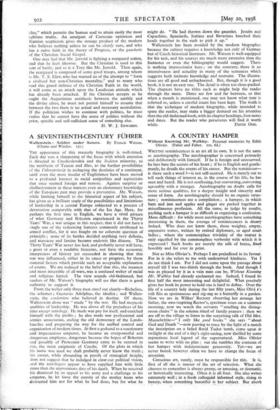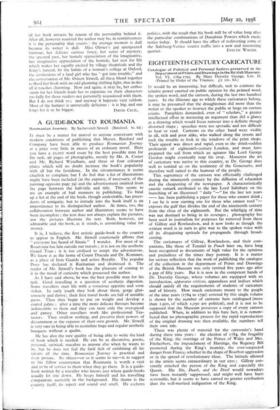A COUNTRY HAMPER
Without Knowing Mr. Walkley. Personal memories by Edith Olivier. (Faber and Faber. 129. 6d.) WRITING reminiscences is an art all its own. It is not the same as autobiography. The • autobiographer is concerned primarily and deliberately with himself. If he is foreign and unreserved, he lays bare the secrets of his heart ; if he is English and gentle- manly, he details the events of his career. But the reminiscor- is there such a word ?—is not self-centred. He is merely out to tell such things of interest as, in the course of his life, he has seen and heard. He is not confessing, but conversing, conversing agreeably with a stranger. Autobiography no doubt calls for more serious qualides, for a deeper insight and sincerity and sense of form. An autobiography should be an organic struc- ture; reminiscences are a compilation ; a hamper, in which ham and jam and apples and ginger are packed together in miscellaneous profusion. All the same, to judge by results, packing such a hamper is as difficult as organising a confession. More difficult : for while most autobiographies have something interesting in them, the average of reminiscences is dreary indeed. Who does not know them, those • weighty, empty, expensive tomes, written by retired diplomats, or aged court ladies ; where the commonplace triviality of the -matter is only equalled by the commonplace verbosity with which it is expressed ? Such books are merely the talk of bores,„. fixed horribly and for ever in print.
Not so Miss Olivier's. Perhaps I am prejudiced in its favour. For in it she refers to me with undeseived kindness. Yet I do not think I am. For I did not come upon the passage about myself till I was two-thirds through the book. And though I was as pleased by it as a vain man can be, Without Knowing Mr. Walkley had already enchanted me. Indeed, I found its first half the most interesting and delightful. What precisely gives her book its power to hold one is hard to define. Over the life of a country lady during the last fifty years, Miss Olivi r's talk flits as spontaneous and zig-zag as a butterfly in a garden. Now we are in Wilkes' Rectory observing her arrange her father, the awe-inspiring Rector's, specimen roses on a summer morning, now we watch the servants " smelling the dining- room chairs " in the solemn ritual of family prayers : then we are off to the village to listen to the surprising talk of Old Mrs. Musselwhite--" I only like good books " she says " about God and Death "—now peering to trace by the light of a match the inscription on a faded florid Tudor tomb, come upon at twilight at the end of a day's sight-seeing, now thrilled by some mysterious local legend of the supernatural. Miss Olivier seems to write with no plan : out she tumbles the contents of her hamper with indeterminate generosity. Yet—we are never bored, however often we have to change the focus of attention.
Conscious art, surely, must be responsible for this. It is, first of all she is master of the art of selection. What she chooses to remember is always pretty, or amusing, or dramatiC, or historically interesting. Often it is all four. She also writes extremely well ; in a fresh colloquial informed style, rising to beauty, when something beautiful is her subject. But abov
all her book attracts by reason of the personality behind it. After all, however reserved the author may be, in reminiscences it is the personality that counts : the average memoir is dull because its writer is dull. Miss Olivier's gay unexpected humour, her delicate curious fancy, her sense of mystery, the spectral past, her homely appreciation of the imaginative, her imaginative appreciation of the homely, her zest for life which makes her equally excited by village theatricals and the King's funeral, by the habits of a woman's college at Oxford, the confessions of a land girl who has " got into trouble," and the conversation of Mr. Osbert Sitwell, all these blend together to flood her book with an odd gleaming shifting light, that makes all it touches charming. Now and again, it may be her enthu- siasm for her friends leads her to expatiate on their characters too fully for those readers not personally acquainted with them. But I do not think so ; and anyway it happens very seldom. Most of the hamper is universally delicious : it is big, and one



















































 Previous page
Previous page